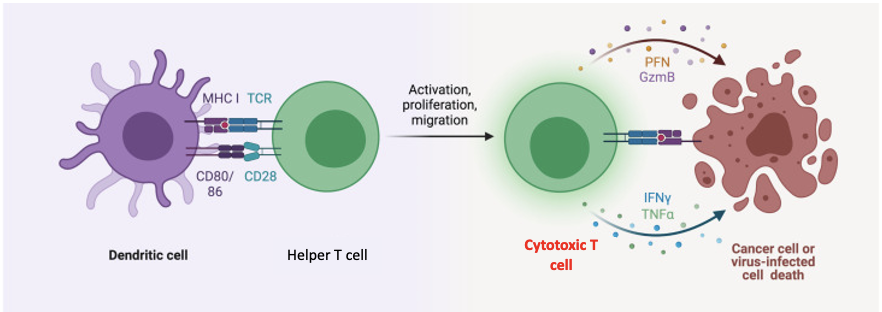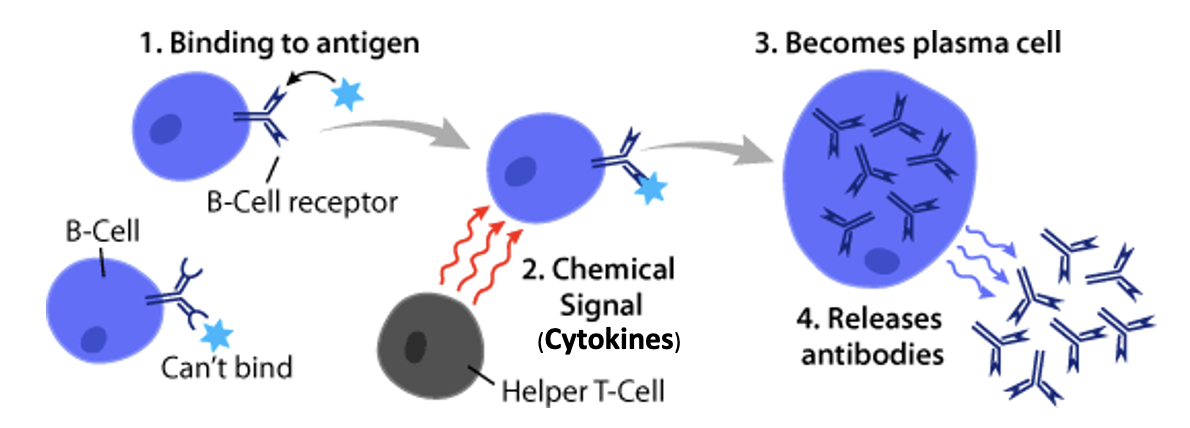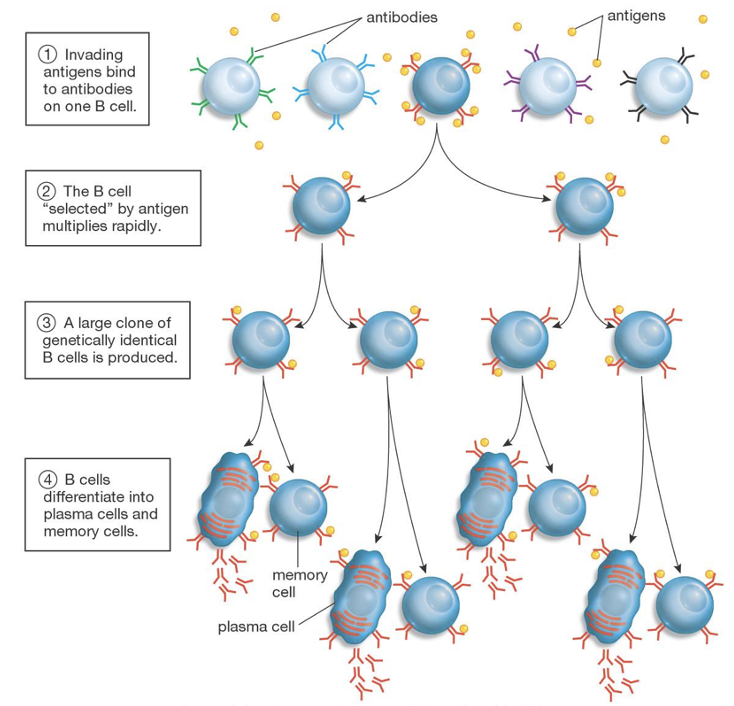Bio C7 - Adaptive immune system
1/19
There's no tags or description
Looks like no tags are added yet.
Name | Mastery | Learn | Test | Matching | Spaced | Call with Kai |
|---|
No analytics yet
Send a link to your students to track their progress
20 Terms
What is the adaptive immune system?
-The adaptive immune system is a highly specific, specialized defense mechanism that provides long-lasting protection by recognising and remembering specific pathogens, such as bacteria and viruses
What are the cells of the immune system?
Erythrocytes – red blood cells
Eosinophil – white blood cell that supports immune system
Basophil – white blood cell that works with immune system
Mast Cell – what blood cell located all over your body
Neutrophil (leukocytes) – white blood cell (first line of defense)
Dendritic cells – immune cells that act as messengers between the innate and adaptive immune systems, specialized in processing and presenting antigens to T cells to initiate a targeted immune response
Hematopoietic stem cell – helps to replenish & blood system
What are the organs (lymphoid organs) of the immune system:
-Each of the lymphoid organs is home to lymphocytes:
Thymus & bone marrow
Lymph nodes & vessels
Spleen
Skin
-Organs of the immune system are connected with each other by a network of lymphatic vessels
-Lymphocytes can travel through blood vessels or lymphatic vessels —> cells & fluids can be exchanged between blood & lyphatic vessels
What does the adaptive immune system have that the innate does not?
-Specificity (the ability to recognise & respond to particular targets)
&
-Memory (2nd exposure produces a larger & more rapid response than primary exposure)
Is the adaptive immune system response much slower than that of the innate immune system response?
-Yes, because it requires time for specific naive B and T cells to be identified, activated, and then multiply to create a large population of effector cells
What is an antibody?
-A protein produced by the human immune system to tag and destroy invasive microbes
What is an antigen?
-Any protein that our immune system uses to recognise self vs non self
What is an antibiotic?
-Various chemicals produced by certain soil microbes that are toxic to many bacteria —> some are used as medicines
What are the main cells involved in the adaptive immune system?
Macrophage:
Effector cells that phagocytose bacteria & secret pro inflammatory mediators
T cells -White blood cells (lymphocytes)
Helper – sends signal to direct other immune cells to fight
Cytotoxic – destroy infected cells
Memory – once antigen clearance has occurred
B cells (plasma, memory):
Make antibodies
Antibodies
What are the 2 lines of defense in the adaptive immune system?
Humoral immunity —> involves B lymphocytes (B cells - mature in bone marrow)
Cell mediated —> involves T lymphocytes (T cells - mature in the thymus)
About antibodies:
•Antibodies are assembled out of protein chains
•Antibodies bind to the unwanted substances in order to eliminate them
•Also known as immunoglobulin
•There are many different chains that the immune system assembles in different ways to make different antibodies
Antibodies as receptors:
-Antibodies can attach to B cells —> allows B cells to detect a specific antigen, which triggers B cell activation
Antibodies as effectors:
-Free antibodies can bind to antigens, which “tag” the antigen for the immune system to attack and destroy
-Link between innate and adaptive immunity
Antigen recognition:
-Cells of the immune system are trained to recognise self vs non-self proteins
-If an antigen (“not self”) protein is encountered by a macrophage, it will bring the protein to a helper T-cell for identification
-If the helper T-cell recognises the protein as “not self,” it will launch an immune response
Helper T cells:
-Have receptors for recognising antigens presented from antigen presenting cells
-If they are presented with an antigen, they release cytokines to stimulate B-cell division and cytotoxic T cells
-Differentiate into memory helper T cells

Cytotoxic (killer) T cells:
-Some T-cells become cytotoxic, or “killer” T-cells.
-Seek out infected cells presenting antigens
-Bind to infected cells and release proteins that enter through pores in infected cell membrane
-Trigger apoptosis (programmed cell death)
Memory T cells:
-Cytotoxic T cells self replicate and divide into memory T cells
-Memory T cells survive a long time and give lifelong immunity
-Can stimulate memory B cells to produce antibodies
-Can trigger production of cytotoxic T cells

B cells:
-B-cells in general produce antibodies
-B-cells differentiate into either plasma cells or memory B-cells
-Plasma cells rapidly produce antibodies
-Memory cells retain the “memory” of the invader and remain ready to divide rapidly if an invasion occurs again

Clonal selection theory
-Explains how the adaptive immune system generates a diverse array of antibodies to specific antigens
What are the roles of antibodies?
-Precipitation —> makes soluble antigen insoluble aiding elimination
-Agglutination —> links cell-bound antigens together, causing clumping
-Neutralisation —> masks dangerous parts of the pathogen
-Inflammation —> triggers histamine release, increasing immune mobility
-Complement —> complement protein perforates the cell membrane (cell lysis)